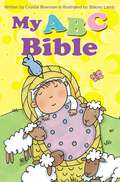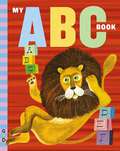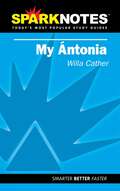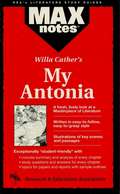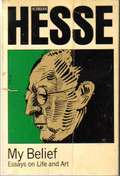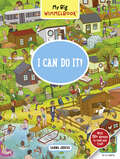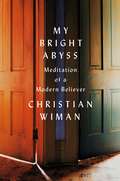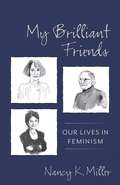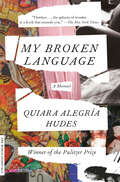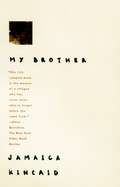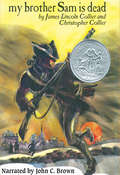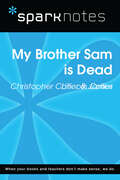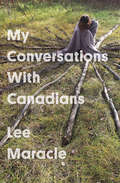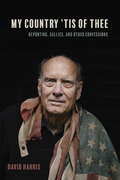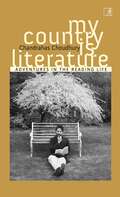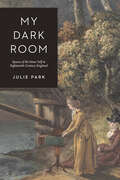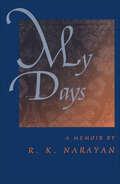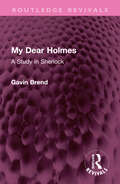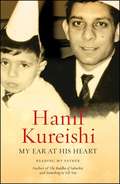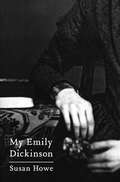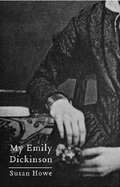- Table View
- List View
My ABC Bible
by Crystal BowmanBestselling author Crystal Bowman introduces preschoolers to the Bible and helps them learn their ABCs with My ABC Bible, a charming book filled with whimsical illustrations and simple, rhyming text.
My ABC Book (G&D Vintage)
by Grosset & DunlapDiscover a treasure trove of beautifully illustrated books with our new series, G+D Vintage! Featuring books from our Wonder Books line originally published in the 1940s, 50s, and 60s, there’s something for every reader in these timeless stories accompanied by classic illustrations.A is for airplane, M is for merry-go-round, and V is for vegetables! Kids will love learning their ABCs with this vintage-illustrated book full of animals, toys, and much more.
My ABC Prayers
by Crystal BowmanUsing rhythm and rhyme, My ABC Prayers uses the alphabet to teach children to pray in simple but meaningful ways. This book includes prayers of praise, thanksgiving, and petition, introducing young children to the many ways they can communicate with their heavenly Father. J is for JOYThank you, God, for times to giggle.For times of fun and JOY.Thank you for the happy daysYou give each girl and boy.
My Antonia (SparkNotes Literature Guide Series)
by SparkNotesMy Antonia (SparkNotes Literature Guide) by Willa Cather Making the reading experience fun! Created by Harvard students for students everywhere, SparkNotes is a new breed of study guide: smarter, better, faster. Geared to what today's students need to know, SparkNotes provides: *Chapter-by-chapter analysis *Explanations of key themes, motifs, and symbols *A review quiz and essay topicsLively and accessible, these guides are perfect for late-night studying and writing papers
My Antonia: MAXNotes Literature Guides
by Tim WenzellREA's MAXnotes for Willa Cather's My Antonia The MAXnotes features a comprehensive summary and analysis of My Antonia and a biography of Willa Cather. Places the events of the novel in historical context and discusses each section in detail. Includes study questions and answers along with topics for papers and sample outlines.
My Belief: Essays on Life and Art
by Hermann Hesse Ralph Manheim Denver Lindley Theodore ZiolkowskiMy Belief: Essays on Life and Art is a collection of essays by Hermann Hesse. The essays, written between 1904 and 1961, were originally published in German, either individually or in various collections between 1951 and 1973. This collection in English was first published in 1976, edited by Theodore Ziolkowski.
My Big Wimmelbook® - I Can Do It!: A Look-and-find Book (kids Tell The Story) (My Big Wimmelbooks #0)
by Sarina JödickeKids will learn 150 phrases for everyday activities in our first wimmelbook with words! The My Big Wimmelbooks series is an effortless introduction to literacy that lets beginning readers ages 2 to 5 be the storyteller—with hours of seek-and-find hands-on learning. In these oversize board books, every page is bursting with life—and tons to discover! Children as young as two have a blast pointing out recognizable things—a blue tricycle, a hungry dog, a piggyback ride—while older kids can follow the star characters from page to page, telling their stories along the way. How? Wimmelbooks are virtually instruction-free, inviting kids to make their own way through the busy Wimmelworld they encounter, and to craft their own stories. First, you’re introduced to a unique cast of characters who are hidden in plain sight on the pages that follow. As you seek them out, each character’s storyline unfolds, but it’s up to kids to interpret the scenes and create stories they think fit. I Can Do It! brings in an extra educational element, with simple text on each spread that parents can read to children or children can try to sound out all by themselves. As the characters explore places like a neighborhood, school, city center, garden, and beachside carnival, short phrases call out what they’re doing. Can you find someone tying their shoes? Look at the friends playing hide-and-seek! Who’s going to sleep? This word-filled wimmelbook is sure to provide hours of imaginative fun—and an excellent introduction to literacy! About Wimmelbooks Wimmelbooks originated in Germany decades ago and have become a worldwide sensation with children (and adults!) everywhere. My Big Wimmelbooks is the first-ever English-language Wimmelbook series. Its books have been praised as “lively . . . and abounding with humor and detail” (WSJ) and likely to “make any parent’s heart sing” (NYT).
My Bright Abyss: Meditation Of A Modern Believer
by Christian WimanSeven years ago, Christian Wiman, a well-known poet and the editor of Poetry magazine, wrote a now-famous essay about having faith in the face of death. My Bright Abyss, composed in the difficult years since and completed in the wake of a bone marrow transplant, is a moving meditation on what a viable contemporary faith—responsive not only to modern thought and science but also to religious tradition—might look like. Joyful, sorrowful, and beautifully written, My Bright Abyss is destined to become a spiritual classic, useful not only to believers but to anyone whose experience of life and art seems at times to overbrim its boundaries. How do we answer this “burn of being”? Wiman asks. What might it mean for our lives—and for our deaths—if we acknowledge the “insistent, persistent ghost” that some of us call God? One of Publishers Weekly's Best Religion Books of 2013.
My Brilliant Friends: Our Lives in Feminism (Gender and Culture Series)
by Nancy K. MillerMy Brilliant Friends is a group biography of three women’s friendships forged in second-wave feminism. Poignant and politically charged, the book is a captivating personal account of the complexities of women’s bonds.Nancy K. Miller describes her friendships with three well-known scholars and literary critics: Carolyn Heilbrun, Diane Middlebrook, and Naomi Schor. Their relationships were simultaneously intimate and professional, emotional and intellectual, animated by the ferment of the women’s movement. Friendships like these sustained the generation of women whose entrance into male-dominated professions is still reshaping American society. The stories of their intertwined lives and books embody feminism’s belief in the political importance of personal experience. Reflecting on aging and loss, ambition and rivalry, competition and collaboration, Miller shows why and how friendship’s ties matter in the worlds of work and love. Inspired in part by the portraits of the intensely enmeshed lives in Elena Ferrante’s Neapolitan novels, My Brilliant Friends provides a passionate and timely vision of friendship between women.
My Broken Language: A Memoir
by Quiara Alegría HudesA Pulitzer Prize–winning playwright tells her lyrical story of coming of age against the backdrop of an ailing Philadelphia barrio, with her sprawling Puerto Rican family as a collective muse. &“Quiara Alegría Hudes is in her own league. Her sentences will take your breath away. How lucky we are to have her telling our stories.&”—Lin-Manuel Miranda, award-winning creator of Hamilton Quiara Alegría Hudes was the sharp-eyed girl on the stairs while her family danced in her grandmother&’s tight North Philly kitchen. She was awed by her aunts and uncles and cousins, but haunted by the secrets of the family and the unspoken, untold stories of the barrio—even as she tried to find her own voice in the sea of language around her, written and spoken, English and Spanish, bodies and books, Western art and sacred altars. Her family became her private pantheon, a gathering circle of powerful orisha-like women with tragic real-world wounds, and she vowed to tell their stories—but first she&’d have to get off the stairs and join the dance. She&’d have to find her language. Weaving together Hudes&’s love of books with the stories of her family, the lessons of North Philly with those of Yale, this is an inspired exploration of home, memory, and belonging—narrated by an obsessed girl who fought to become an artist so she could capture the world she loved in all its wild and delicate beauty.
My Brother
by Jamaica KincaidJamaica Kincaid's incantatory, poetic, and often shockingly frank recounting of her brother Devon Drew's life is also the story of her family on the island of Antigua, a constellation centered on the powerful, sometimes threatening figure of the writer's mother. Kincaid's unblinking record of a life that died too early speaks volumes about the difficult truths at the heart of all families.
My Brother Sam Is Dead
by James Lincoln Collier Christopher CollierThe classic story of one family torn apart by the Revolutionary War <P><P> All his life, Tim Meeker has looked up to his brother Sam. Sam's smart and brave -- and is now a part of the American Revolution. Not everyone in town wants to be a part of the rebellion. Most are supporters of the British -- including Tim and Sam's father.<P> With the war soon raging, Tim know he'll have to make a choice -- between the Revolutionaries and the Redcoats... and between his brother and his father.<P> Newbery Medal Honor book<P> Jane Addams Children’s Book Award Honor Book
My Brother Sam is Dead (SparkNotes Literature Guide Series)
by SparkNotesMy Brother Sam is Dead (SparkNotes Literature Guide) by James Lincoln Collier Making the reading experience fun! Created by Harvard students for students everywhere, SparkNotes is a new breed of study guide: smarter, better, faster. Geared to what today's students need to know, SparkNotes provides: *Chapter-by-chapter analysis *Explanations of key themes, motifs, and symbols *A review quiz and essay topicsLively and accessible, these guides are perfect for late-night studying and writing papers
My Childhood
by Maxim Gorky Ronald WilksAppearing in 1913, this is the first part of Maxim Gorky's autobiographical trilogy.
My Conversations With Canadians (Essais Series #4)
by Lee MaracleMy Conversations With Canadians is the book that "Canada150" needs.Harkening back to her first book tour at the age of 26 (for the autobiographical novel Bobbi Lee: Indian Rebel), and touching down upon a multitude of experiences she's had as a Canadian, a First Nations leader, a woman and mother and grandmother over the course of her life, Lee Maracle's My Conversations with Canadians presents a tour de force exploration into the writer's own history and a re-imagining of the future of our nation.In this latest addition to BookThug's Essais Series (edited by poet Julie Joosten), Maracle's writing works to engage readers in thinking about the threads that keep Canadians tied together as a nation—and also, at times, threaten to pull us apart—so that the sense of sovereignty and nationhood that she feels may be understood and even embraced by Canadians.
My Country 'Tis of Thee: Reporting, Sallies, and Other Confessions
by David HarrisDavid Harris is a reporter, a clear-eyed idealist, an American dissident, and, as these selected pieces reveal, a writer of great character and empathy. Harris gained national recognition as an undergraduate for his opposition to the Vietnam War and was imprisoned for two years when he refused to comply with the draft. His writings trace a bright throughline of care for and attention to outsiders, the downtrodden, and those who demand change, and these eighteen pieces of long-form journalism, essays, and opinion writings remain startlingly relevant to the world we face today. This career-spanning collection of writings by an always-independent journalist follow Harris from his early days as a prominent leader of the resistance to the Vietnam War, through regular contributions to many publications, including Rolling Stone and the New York Times, and on into the twenty-first century.Born in Fresno and elected student body president of Stanford University in 1966, Harris has always had an undeniably Californian point of view—he imagines the future with an open heart and mind and pursues stories out of genuine curiosity, embedding himself among striking farmworkers, marijuana growers, the homeless on LA’s skid row, and occasionally, redwood trees. Inspiring, clarifying, and fearless, his abiding and lucid patriotism insists that our country live up to its own ideals.
My Country Is Literature: Adventures in the Reading Life
by Chandrahas Choudhury'A book is only one text, but it is many books. It is a different book for each of its readers. My Anna Karenina is not your Anna Karenina; your A House for Mr Biswas is not the one on my shelf. When we think of a favourite book, we recall not only the shape of the story, the characters who touched our hearts, the rhythm and texture of the sentences. We recall our own circumstances when we read it: where we bought it (and for how much), what kind of joy or solace it provided, how scenes from the story began to intermingle with scenes from our life, how it roused us to anger or indignation or allowed us to make our peace with some great private discord. This is the second life of the book: its life in our life.' In his early twenties, the novelist Chandrahas Choudhury found himself in the position of most young people who want to write: impractical, hard-up, ill at ease in the world. Like most people who love to read, his most radiant hours were inside the pages of a book. Seeking to combine his love of writing with his love of reading, he became an adept of a trade that is mainly transacted lying down—that is, he became a book reviewer.Pleasure, independence, aesthetic rapture, even a modest livelihood: all these were the rewards of being a worker bee of literature, ingesting the output of the publishers of the world in great quantities and trying to explain in the pages of newspapers and magazines exactly what makes a book leave a mark on the soul. Even as Choudhury's own novels began to be published, he continued to write about other writers' books: his contemporaries at home and abroad, the great Indian writers of the past, the relationship of the reading life —in particular, the novel—to selfhood and democracy, all the ways in which literature sings the truths of the human heart.My Country Is Literature brings together the best of his literary criticism: a long train of perceptive essays on writers as diverse as VS Naipaul and Orhan Pamuk, Gandhi and Nehru, Bibhutibhushan Bandyopadhyay and Jhumpa Lahiri. The book also contains an introductory essay describing Choudhury's book-saturated years as a young writer in Mumbai, the joys and sorrows and stratagems of the book reviewer's trade, and the ways in which literature is made as much by readers as by writers.Delightfully punctuated with 15 portraits of writers by the artist Golak Khandual, My Country Is Literature is essential reading for everyone who believes that books are the most beautiful things in life.
My Dark Room: Spaces of the Inner Self in Eighteenth-Century England
by Julie ParkExamines spaces of inner life in eighteenth-century England to shed new light on interiority in literature and visual and material culture. In what kinds of spaces do we become most aware of the thoughts in our own heads? In My Dark Room, Julie Park explores places of solitude and enclosure that gave eighteenth-century subjects closer access to their inner worlds: grottos, writing closets, landscape follies, and the camera obscura, that beguiling “dark room” inside which the outside world in all its motion and color is projected. The camera obscura and its dreamlike projections within it served as a paradigm for the everyday spaces, whether in built environments or in imaginative writing, that generated the fleeting states of interiority eighteenth-century subjects were compelled to experience and inhabit. My Dark Room illuminates the spatial and physical dimensions of inner life in the long eighteenth century by synthesizing material analyses of diverse media, from optical devices and landscape architecture to women’s intimate dress, with close readings of literary texts not traditionally considered together, among them Andrew Marvell’s country house poem Upon Appleton House, Margaret Cavendish’s experimental epistolary work Sociable Letters, Alexander Pope’s heroic verse epistle Eloisa to Abelard, and Samuel Richardson’s novel Pamela. Park also analyzes letters and diaries, architectural plans, prints, drawings, paintings, and more, drawing our attention to the lively interactions between spaces and psyches in private environments. Park’s innovative method of “spatial formalism” reveals how physical settings enable psychic interiors to achieve vitality in lives both real and imagined.
My Dark Room: Spaces of the Inner Self in Eighteenth-Century England
by Julie ParkExamines spaces of inner life in eighteenth-century England to shed new light on interiority in literature and visual and material culture. In what kinds of spaces do we become most aware of the thoughts in our own heads? In My Dark Room, Julie Park explores places of solitude and enclosure that gave eighteenth-century subjects closer access to their inner worlds: grottos, writing closets, landscape follies, and the camera obscura, that beguiling “dark room” inside which the outside world in all its motion and color is projected. The camera obscura and its dreamlike projections within it served as a paradigm for the everyday spaces, whether in built environments or in imaginative writing, that generated the fleeting states of interiority eighteenth-century subjects were compelled to experience and inhabit.My Dark Room illuminates the spatial and physical dimensions of inner life in the long eighteenth century by synthesizing material analyses of diverse media, from optical devices and landscape architecture to women’s intimate dress, with close readings of literary texts not traditionally considered together, among them Andrew Marvell’s country house poem Upon Appleton House, Margaret Cavendish’s experimental epistolary work Sociable Letters, Alexander Pope’s heroic verse epistle Eloisa to Abelard, and Samuel Richardson’s novel Pamela. Park also analyzes letters and diaries, architectural plans, prints, drawings, paintings, and more, drawing our attention to the lively interactions between spaces and psyches in private environments. Park’s innovative method of “spatial formalism” reveals how physical settings enable psychic interiors to achieve vitality in lives both real and imagined.
My Days: A Memoir
by R. K. Narayan"I am inclined to call this the last chapter, but how can an autobiography have a final chapter? At best, it can only be a penultimate one; nor can it be given a rounded-off conclusion, as is possible in a work of fiction." So begins the last chapter of My Days, the only memoir from R. K. Narayan, hailed as "India's most notable novelist and short-story writer" by the New York Times Book Review.In his usual winning, humorous style, R. K. Narayan shares his life story, beginning in his grandmother's garden in Madras with his ferocious pet peacock. As a young boy with no interest in school, he trains grasshoppers, scouts, and generally takes part in life's excitements. Against the advice of all, especially his commanding headmaster father, the dreaming Narayan takes to writing fiction, and one of his pieces is accepted by Punch magazine (his "first prestige publication"). Soon his life includes bumbling British diplomats, curious movie moguls, evasive Indian officials, eccentric journalists, and "the blind urge" to fall in love. R. K. Narayan's larger-than-life perception of the human comedy is at once acute and forgiving, and always true to it.
My Dear Holmes: A Study in Sherlock (Routledge Revivals)
by Gavin BrendFirst published in 1951, My Dear Holmes is a biography of Sherlock Holmes, which originated from the author’s re-reading of the Sherlock Holmes stories to his daughter, supplies answers to mysteries such as when was Holmes born? Which was his university? How many times was Watson married and in what years? Why did he leave Baker Street without a word of explanation in 1896? Why did the two Moriarty brothers have the same Christian name? Why were there apparently different cases all known as "the Second Stain"? The author takes the sixty cases narrated by Watson, many of which are undated, deduces the year in each case, and weaves the whole into a single continuous story, with the intention of filling the gaps in our knowledge of Sherlock Holmes and Dr. Watson. To those who are partial to the London of gaslight, hansom cabs, feather boas and income tax at one shilling and twopence in the pound, this book can be recommended.
My Ear at His Heart: Reading My Father
by Hanif KureishiDescribed in a recent New York Times Magazine profile as a "postcolonial Philip Roth," Hanif Kureishi first captured the attention of audiences and critics in the 1980s with the award-winning novel The Buddha of Suburbia and the films My Beautiful Laundrette, and Sammy and Rosie Get Laid. In three decades of acclaimed work, Kureishi has written fiction and films exploring a series of interconnected themes about identity and desire-—from Islamic radicalism to kinky sex, and from psychoanalysis to the relationships of fathers and sons. After discovering an abandoned manuscript of his father’s, hidden for years, Kureishi was compelled to turn his "unflinching perspective" (Time Out) onto his own history. Like Roth, Martin Amis and Geoffrey Wolfe, who also have written books about their fathers, Kureishi wanted to understand and perhaps to reconcile. My Ear at His Heart offers remarkable insight into the birth of a writer, chronicling how Kureishi’s own literary calling emerged from the ashes of his father’s aspirations. And so begins a journey that takes Kureishi through his father’s privileged childhood by the sea in Bombay, through the turbulent birth of Pakistan and to his modest adult life in England—-his days spent as a civil servant, his nights writing prose, hopeful of one day receiving literary recognition. "A beguiling and complex tale of fact, fiction and family tensions" (The Guardian), My Ear at His Heart was published to great acclaim in the United Kingdom in 2004 and went on to win the prestigious Prix France Culture Etranger.
My Emily Dickinson
by Eliot Weinberger Susan Howe"Starts off as a manifesto but becomes richer and more suggestive as it develops."--The New York Sun With exacting rigor and wit, Howe pulls Dickinson free of all the sterile and stuffy belle-of-Amherst cotton wool and shows the poet in touch with elemental forces of nature, and as a prophet in all her radical zealotry and poetic glory. Her Emily Dickinson is a unique American genius, a demon lover of poetry--no neurasthenic spider artist. Howe draws into her discussion Browning, Wuthering Heights, the Civil War, "Master," the great Puritan preachers, captivity narratives, Shakespeare, and phantom lovers. As she chases away narrow and reductive feminist readings of the poet, Howe finds instead a radically powerful and true feminism at work in Dickinson, focusing the whole on that heart-stopping poem "My Life had stood--a Loaded Gun." A remarkable and passionate poet-on-poet engagement, My Emily Dickinson frees a great poet from the fetters of being read as a special female neurotic, and sets her against a fiery open sky where "Perception of an object means loosing and losing it...only Mutability certain." My Emily Dickinson won The Before Columbus Foundation Book Award.
My Emily Dickinson
by Susan HoweMy Emily Dickinson won The Before Columbus Foundation Book Award. In this book, with exacting rigor and wit, Howe pulls Dickinson free of all the sterile and stuffy belle-of-Amherst cotton wool and shows the poet in touch with elemental forces of nature, and as a prophet in all her radical zealotry and poetic glory.
